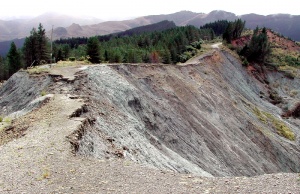Terrestrial WG 2009
CSDMS Terrestrial Working Group meeting, February 2-3, 2009

| Date: February 2-3, 2009 |
| Location: University of Colorado at Boulder (CO), USA |
| Host: CSDMS |
Introduction
The Terrestrial Working Group deals with weathering, hillslope, fluvial, glacial, aeolian, lacustrial challenges.
Participants
If you are interested to join this meeting, please contact the Terrestrial WG Chair, Greg Tucker (gtucker@cires.colorado.edu). Registration deadline is January 12, 2009. If you have special circumstances and would like to join after January 12, please contact the Chair, Greg Tucker. Thank you.
Personal invitations have been sent to specific CSDMS members with expertise in these areas to contribute to the discussion and planning of short- and long-term goals.
Circulars and Program
The agenda for this meeting of the Terrestrial Working Group is two-fold. The first aim is to bring the working group up to speed on the progress that the I.F. team has made in developing methods and protocols for coupling modules, as well as to provide an overview of how to modify your own code so that it can be integrated into the CSDMS framework. The second aim is to make progress on three fronts:
- completing the process of “domain and model scoping” that we began at last year’s meeting, possibly leading to a review paper;
- identifying, developing, adding, and linking model components (including outlining methods for handling issues such as moving boundaries); and
- identifying existing data sets, and criteria for future data sets, that can be used for testing models and providing proof-of-concept applications.
The Terrestrial Working Group will meet for 2 days.
Working Agenda
Second Meeting of the CSDMS Terrestrial Working Group February 2-3, 2009 University of Colorado at Boulder
Goals:
1) Update the Terrestrial Working Group on current status of CSDMS activities 2) Provide basic information on how to use CSDMS tools 3) Discuss and develop recommendations on current state of the art (basic knowledge, existing computer models, knowledge/model gaps), essential components of a first-generation model, and key research needs. 4) Discuss and develop recommendations on modeling issues and potential strategies, including topics such as handling moving boundaries and developing generic data structures for topography, soil, stratigraphy, etc. 5) Discuss and develop recommendations on criteria for proof-of-concept tests and types of tests needed; identify and begin to characterize potential study sites and databases.
Expected Outcome:
1) Participants will become familiar with CSDMS tools and concepts, such as CCA, OpenMI, basic steps in adapting models to the framework, and use of the CSMDS Wiki pages. 2) Meeting report to CSDMS Executive and Steering Committees and other working and focus groups. 3) First steps toward outlining and drafting three potentially publishable white papers (tentatively covering Scoping, Modeling, and Applications, respectively).
Format: The format will consist of a mix of presentations, demonstrations and hands-on exercises, breakout discussion groups, and writing sessions. Most time will be devoted to breakout-group and whole-group discussions.
Agenda:
Day 1, February 2, 2009
8:15 Light breakfast 8:30 Welcome and Meeting Overview – Greg Tucker 8:35 Welcome and Logistics – Marlene Lofton 8:40 Group Introductions – everyone is asked to take about one minute to introduce him or herself and interests as related to CSDMS 9:00 Overview and Status of CSDMS Activities – James Syvitski, Executive Director of CSDMS 9:45 Overview of CCA and OpenMI – Scott Peckham, CSDMS Senior Software Architect 10:15 Break 10:30 CCA Demos and hands-on examples 11:30 Charge to Working Groups; Confirm/Modify Discussion Topics and Form Groups; Introduction to Pop-ups 12:00 Lunch 1:15 Pop-ups: optional 3-5 minute presentations by participants as the spirit moves them; for example, sharing CSDMS-related activities you are involved in, presenting models you work with, books you’ve written, modeling ideas, proof-of-concept ideas, etc. 2:00 Breakout Session #1. Tentative groups: Scoping, Modeling, and Applications 3:00 Break 3:15 Breakout Session #2 4:00 Reports from Breakout Groups and group discussion 5:00 Adjourn
6:00 Dinner at participants’ expense
Day 2, February 3, 2009
8:15 Light breakfast
8:30 Overview and Plan for the Day – Greg Tucker
8:35 Breakout Session #3
10:15 Break
10:30 Interlude – How to use the CSDMS Wiki pages
11:00 Breakout reports and group discussion
12:00 Lunch
1:15 Writing session
2:30 Re-group and planning follow-on activities
3:00 Adjourn main meeting
3:00-5:00 Optional: time to work one-on-one with CSDMS Integration Facility personnel on issues such as making code CSDMS-compliant, practicing with CCA and/or OpenMI, adding models to the CSDMS repository, working with CSDMS Wiki pages, etc.
